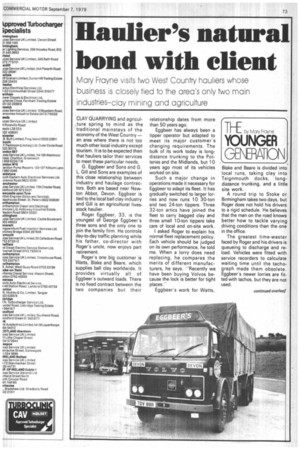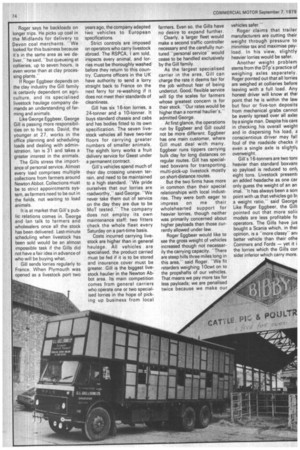Haulier's natural bond with client
Page 75

Page 76

If you've noticed an error in this article please click here to report it so we can fix it.
Mary Frayne visits -wo West Country hauliers whose business is closely tied to the area's only -wo main industries-clay mining and agriculture CLAY QUARRYING and agricul,ture spring to mind as the traditional mainstays of the economy of the West Country — an area where there is not too much other local industry except tourism. It is to be expected then that hauliers tailor their services to meet these particular needs.
G. Eggbeer and Sons and G. L. Gill and Sons are examples of this close relationship between industry and haulage contractors. Both are based near Newton Abbot, Devon. Eggbeer is tied to the local ball clay industry and Gill is an agricultural livesstock haulier,
Roger Eggbeer, 33, is the youngest of George Eggbeer's three sons and the only one to join the family firm. He controls day-to-day traffic planning while his father, co-director with Roger's uncle, now enjoys part retirement.
Roger's one big customer is Watts, Blake and Beare, which supplies ball clay worldwide. It provides virtually all of Eggbeer's outward loads. There is no fixed contract between the two companies but their relationship dates from more than 50 years ago.
Eggbeer has always been a tipper operator but adapted to meet its major customer's changing requirements. The bulk of its work today is longdistance trunking to the Potteries and the Midlands, but 10 years ago most of its vehicles worked on site.
Such a major change in operations made it necessary for Eggbeer to adapt its fleet. It has gradually switched to larger lorries and now runs 10 30-ton and two 24-ton tippers. Three 32-ton artics have joined the fleet to carry bagged clay and three small 10-ton tippers take care of local and on-site work.
I asked Roger to explain his normal fleet replacement policy. Each vehicle should be judged on its own performance, he told me. When a lorry does need replacing, he compares the merits of different manufacturers, he says. -Recently we have been buying Volvos because the lock. is better for tight places.'"
Eggbeer's work for Watts, Blake and Beare is divided into local runs, taking clay into Teignmouth docks, longdistance trunking, and a little site work.
A round trip to Stoke or Birmingham takes two days, but Roger does not hold his drivers to a rigid schedule. He believes that the man on the road knows better how to tackle varying driving conditions than the one in the office.
The greatest time-waster faced by Roger and his drivers is queueing to discharge and reload, Vehicles were fitted with service recorders to calculate waiting time until the tachograph made them obsolete. Eggbeer's newer lorries are fitted with tachos, but they are not used. Roger says he backloads on longer trips. He picks up coal in the Midlands for delivery to Devon coal merchants, "We looked for this business because ifs in the same area as 'we deliver," he said, "but queueing at collieries, up to seven hours, is even worse than at clay processing plants."' If Roger Eggbeer depends on the clay industry the Gill family is certainly dependent on agriculture, and its specialised livestock haulage company demands an understanding of farming and animals.
Like George Eggbeer, George Gill is passing more responsibilities on to his sons. David, the younger at 27, works in the office planning and scheduling loads and dealing with administration. Ian is 31 and takes a greater interest in the animals.
The Gills stress the importance of personal service. Almost every load comprises multiple collections from farmers around Newton Abbot. Collections must be to strict appointments system, as farmers need to be out in the fields, not waiting to load animals.
It is at market that Gill's public relations comes in. neorge and Ian talk to farmers and wholesalers once all the stock has been delivered. Last-minute scheduling when livestock has been sold would be an almost impossible task if the Gills did not have a fair idea in advance of who will be buying what.
Gill sends lorries regularly to France. When Plymouth was opened as a livestock port two years ago, the company adapted tsivo vehicles to European specifications.
Strict controls are imposed on operators who carry livestock abroad. The RSPCA, I am told, inspects every animal, and lorries must be thoroughly washed before they return to this country. Customs officers in the UK have authority to send a lorry straight back to France on the next ferry for re-washing if it does not meet their standards of cleanliness.
Gill has six 16-ton lorries, a 24-tonner and a 10-tonner. It buys standard chassis and cabs and has bodies fitted to its own specification. The seven livestock vehicles all have two-tier floors for carrying greater numbers of smaller animals. The eighth lorry works a fruit delivery service for Geest under a permanent contract.
Gill's vehicles spend much of their day crossing uneven terrain, and need to be maintained to a high standard. "We pride ourselves that our lorries are roadworthy," said George. "We never take them out of service on the day they are due to be MoT tested."' The company does not employ its own maintenance staff; two fitters check the whole fleet every Saturday on a part-time basis.
Costs incurred carrying livestock are higher than in general haulage. All vehicles are specialised, the product carried must be fed if it is to be stored and insurance cover must be greater. Gill is the biggest livestock haulier in the Newton Abbot area. Its main competition comes from general carriers who operate one or two specialised lorries in the hope of picking up business from local farmers. Even so, the Gills have no desire to expand further.
Clearly, a larger fleet would make a second traffic controller necessary and the carefully nurtured "personal service" would cease to be handled exclusively by the Gill family.
As the largest specialised carrier in the area, Gill can charge the rate it deems fair for the job without fear of being undercut. Good, flexible service will tip the scales for farmers whose greatest concern is for their stock. "Our rates would be higher than a normal haulier's," admitted George.
At first glance, the operations run by Eggbeer and Gill could not be more different. Eggbeer has one main customer, where Gill must deal with many. Eggbeer runs tippers carrying bulk clay for long distances on regular routes. Gill has specialised boxvans for transporting multi-pick-up livestock mostly on short-distance routes.
But the two firms have more in common than their special relationships with local industries. They were both eager to impress on me their wholehearted support for heavier lorries, though neither was primarily concerned about higher payloads than those currently allowed under law.
Roger Eggbeer would like to see the gross weight of vehicles increased though not necessarily the carrying capacity. "There are steep hills three miles long in this area," said Roger. '"We fit retarders weighing lOcwt on to the propshafts of our vehicles. That means we pay more tax for less payloads; we are penalised twice because we make our vehicles safer."
Roger claims that trailer manufacturers are cutting their weight through pressure to minimise tax and maximise payload. In his view, slightly heavier lorries would be safer.
Another weight problem stems from the DTp's practice of weighing axles separately. Roger pointed out that all lorries are weighed at collieries before leaving with a full load. Any honest driver will know at that point that he is within the law but four or five-ton deposits from mechanical grabs cannot be evenly spread over all axle: by a single man. Despite his care in checking his overall weighi and in dispersing his load, a conscientious driver may fall foul of the roadside checks il even a single axle is slightly overweight.
Gill's 1 6-tonners are two ton: heavier than standard boxyanE so payload is reduced to only eight tons. Livestock present an added headache as one car only guess the weight of an an imal. "It has always been a sou point with us that vehicles go ID\ a weight ratio," said George Like Roger Eggbeer, the Gill: pointed out that more soli( models are less profitable to operators. The Gills have jus bought a Scania which, in thei opinion, is a "more classy" ant better vehicle than their othe Commers and Fords — yet it i the lorries which the Gills cor sider inferior which carry more.












































































































































